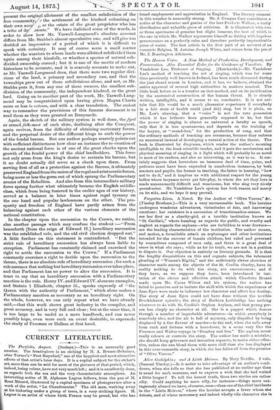The Human Voice. A New Method of Production, Development, and
Preservation. Also Essential Rules for the Guidance of Vocalists. By Vandeleur Lee, Professor of Singing. (Ilatchards.)-3Ir. Vandeleur Lee's method of teaching the art of singing, which was for some time previously well known in Ireland, has been much discussed during tho just closed season in London, and it has, we believe, obtained the entire approval of several high authorities in matters musical. The little book before us is a treatise on that method, and on its justification by the anatomical construction of the human throat. It is clearly written, intelligible, and it seems to us, conclusive. It is not cer- tain that life would be a mach pleasanter experience if everybody in a fair state of health could (and did) sing, but it is plain, on Mr. Lee's showing, that a " voice " is not the rare possession which it has hitherto been generally supposed to be, but that the power of singing is almost as universal a faculty as speech, only that it is less spontaneous, and depends on the training of the larynx, or "sound-box," for the production of song, and that the ordinary methods of teaching are erroneous, because they enforce an unnatural instead of developing a natural action of the throat. The book is illustrated by diagrams, which render the author's meaning intelligible to the least scientific reader, and it puts the mechanism and physical moaning of singing in a light which will probably be as novel to most of its readers, and also as interesting, as it was to us. It cer- tainly suggests that heretofore an immense deal of time, pains, and patience must have been expended in numberless instances, by both masters and pupils, the former in teaching, the latter in learning, "how not to do it," and it inspires us with additional respect for the young ladies whose larynxes never get fair-play, to whom the art they love is made unnecessarily difficult and wearisome, but who sing very nicely guand-meme. Mr. Vandeleur Lee's system has both reason and mercy on its side, and we hope it may prevail.






























 Previous page
Previous page